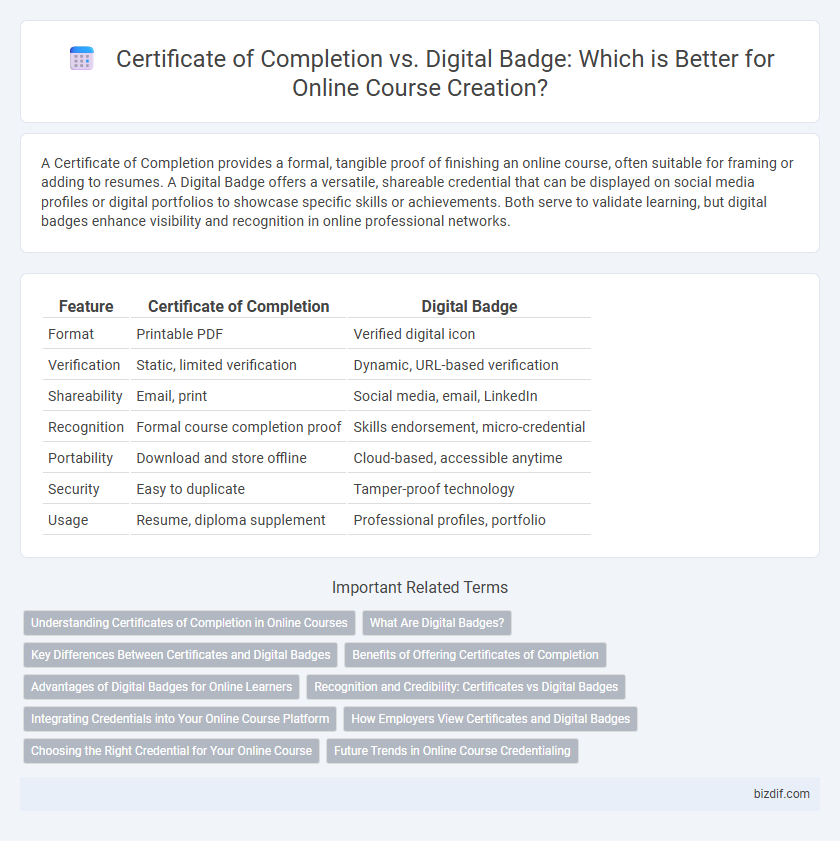A Certificate of Completion provides a formal, tangible proof of finishing an online course, often suitable for framing or adding to resumes. A Digital Badge offers a versatile, shareable credential that can be displayed on social media profiles or digital portfolios to showcase specific skills or achievements. Both serve to validate learning, but digital badges enhance visibility and recognition in online professional networks.
Table of Comparison
| Feature | Certificate of Completion | Digital Badge |
|---|---|---|
| Format | Printable PDF | Verified digital icon |
| Verification | Static, limited verification | Dynamic, URL-based verification |
| Shareability | Email, print | Social media, email, LinkedIn |
| Recognition | Formal course completion proof | Skills endorsement, micro-credential |
| Portability | Download and store offline | Cloud-based, accessible anytime |
| Security | Easy to duplicate | Tamper-proof technology |
| Usage | Resume, diploma supplement | Professional profiles, portfolio |
Understanding Certificates of Completion in Online Courses
Certificates of Completion in online courses serve as formal recognition that a learner has successfully finished a specific curriculum, often including course title, participant name, and completion date for verifiable proof. These certificates typically carry institutional branding and can be downloaded or printed, offering tangible evidence of achieved competencies and motivating continued education. Unlike digital badges, certificates emphasize official acknowledgment rather than micro-credentials, playing a crucial role in professional portfolios and academic records.
What Are Digital Badges?
Digital badges are verifiable, shareable credentials that demonstrate specific skills or achievements earned through online course completion. Unlike traditional certificates, digital badges are embedded with metadata that includes issuer details, criteria, and evidence of accomplishment, enhancing credibility and portability. These badges can be displayed on social media profiles, professional networks, or digital resumes to showcase expertise effectively.
Key Differences Between Certificates and Digital Badges
Certificates of completion are formal documents that verify the successful conclusion of an online course, often including the learner's name, course title, and date of completion. Digital badges are graphic representations embedded with metadata that showcase specific skills, achievements, or competencies earned through the course and can be easily shared on social media or professional platforms. Unlike certificates, digital badges offer interactive verification and micro-credentialing, enabling instant validation and highlighting granular achievements within a course framework.
Benefits of Offering Certificates of Completion
Certificates of Completion provide tangible proof of skills acquired, enhancing learner motivation and credibility in professional settings. These certificates can be easily shared on resumes, LinkedIn profiles, and job applications, increasing learner visibility to employers. Offering Certificates of Completion also fosters course engagement and boosts student retention rates by rewarding commitment and achievement.
Advantages of Digital Badges for Online Learners
Digital badges offer online learners instant verification of skills with embedded metadata that validates achievement across multiple platforms. They enhance employability by allowing easy sharing on social media, professional networks, and job applications, increasing visibility to potential employers. Digital badges also motivate continuous learning through gamification elements and provide a portable, secure way to showcase competencies beyond traditional certificates.
Recognition and Credibility: Certificates vs Digital Badges
Certificates of Completion provide formal recognition with a traditional, printable format that is widely accepted by employers and educational institutions, enhancing the learner's credibility. Digital Badges offer a versatile, easily shareable credential embedded with metadata detailing skills acquired, which can be displayed on social media and professional networks to boost visibility. Both tools serve to validate learning achievements, but digital badges emphasize verifiable skill endorsements while certificates underscore formal educational recognition.
Integrating Credentials into Your Online Course Platform
Certificates of Completion are printable documents that validate learner achievement and can be easily integrated into LMS platforms like Canvas and Moodle via PDF generation tools. Digital Badges offer dynamic, shareable credentials embedded with metadata, enabling automatic verification through platforms such as Credly and Badgr, which seamlessly connect to eLearning systems via APIs. Integrating these credentials into your online course platform enhances learner motivation and provides verifiable proof of skills for employers and educational institutions.
How Employers View Certificates and Digital Badges
Employers often view certificates of completion as formal recognition of acquired skills within a structured course, typically verifying foundational knowledge. Digital badges, however, offer granular insights into specific competencies and achievements, allowing employers to easily verify skills through embedded metadata and third-party validation. The preference depends on industry and role, but digital badges are increasingly valued for their transparency and ability to showcase continuous learning and micro-credentialing in online course platforms.
Choosing the Right Credential for Your Online Course
Certificates of Completion provide a formal, printable acknowledgment of a learner's achievement, ideal for professional development and resume enhancement, while Digital Badges offer a verifiable, shareable, and interactive credential suited for social media and online portfolios. Selecting the right credential depends on your target audience's preferences and the intended use of the credential; businesses and academic institutions often favor certificates, whereas technology and creative industries embrace digital badges for their instant validation and engagement capabilities. Understanding these differences ensures that your online course's credential maximizes learner motivation and industry relevance.
Future Trends in Online Course Credentialing
Digital badges are rapidly gaining traction over traditional Certificates of Completion due to their verifiable, shareable, and interactive nature on professional platforms like LinkedIn. Future trends in online course credentialing emphasize blockchain technology for secure, tamper-proof digital badges, enhancing trust and recognition among employers. Micro-credentials and stackable badges are becoming prevalent, enabling learners to showcase specific skills and achieve modular career pathways efficiently.
Certificate of Completion vs Digital Badge Infographic

 bizdif.com
bizdif.com